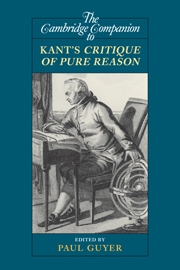Book contents
- Frontmatter
- Introduction
- Part I The Background to the Critique
- Part II The Arguments of the Critique
- 3 The Introduction to the Critique: Framing the Question
- 4 The Transcendental Aesthetic
- 5 The Deduction of the Categories: The Metaphysical and Transcendental Deductions
- 6 The System of Principles
- 7 The Refutation of Idealism and the Distinction between Phenomena and Noumena
- 8 The Ideas of Pure Reason
- 9 The Paralogisms of Pure Reason
- 10 The Antinomies of Pure Reason
- 11 The Ideal of Pure Reason
- 12 The Appendix to the Dialectic and the Canon of Pure Reason: The Positive Role of Reason
- 13 The Transcendental Doctrine of Method
- Part III The Impact of the Critique
- Bibliography
- Index
10 - The Antinomies of Pure Reason
from Part II - The Arguments of the Critique
Published online by Cambridge University Press: 28 July 2010
- Frontmatter
- Introduction
- Part I The Background to the Critique
- Part II The Arguments of the Critique
- 3 The Introduction to the Critique: Framing the Question
- 4 The Transcendental Aesthetic
- 5 The Deduction of the Categories: The Metaphysical and Transcendental Deductions
- 6 The System of Principles
- 7 The Refutation of Idealism and the Distinction between Phenomena and Noumena
- 8 The Ideas of Pure Reason
- 9 The Paralogisms of Pure Reason
- 10 The Antinomies of Pure Reason
- 11 The Ideal of Pure Reason
- 12 The Appendix to the Dialectic and the Canon of Pure Reason: The Positive Role of Reason
- 13 The Transcendental Doctrine of Method
- Part III The Impact of the Critique
- Bibliography
- Index
Summary
The Second Chapter of Book Two of the Transcendental Dialectic, which deals with the pretensions of rational cosmology, contains one of the most ambitious discussions in the Critique of Pure Reason. Its argument is as far-ranging and complex as any in the entire Critique (even that of the Transcendental Deduction of the Categories). One aim is to show that any pure rational doctrine of the world's constitution is led inevitably, through a system of cosmological ideas or pure concepts of reason, into contradictions, based not on the contingent errors of any individual metaphysician but on reason's own necessary principles and procedures. A second aim is to discredit, more specifically, the pseudo-science of rational cosmology that was part of Wolffian metaphysics, by showing that if its claims to cognition were valid, they would drive reason into contradiction with itself. A third aim is to establish the central claims of the critical philosophy, especially transcendental idealism, as essential to the resolution of the antinomies. Yet a fourth aim is to understand each of the issues that give rise to the antinomies individually, resolving the problem from which it arose. Finally, Kant claims that the antinomies concern not only theoretical philosophy but also the practical interests of reason.
- Type
- Chapter
- Information
- The Cambridge Companion to Kant's Critique of Pure Reason , pp. 245 - 265Publisher: Cambridge University PressPrint publication year: 2010
- 6
- Cited by



